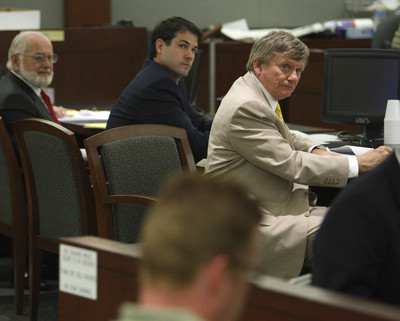Businessman’s case against Sands Corp. gets under way
Opening statements began Wednesday in what is expected to be a monthlong civil trial to determine whether a Hong Kong businessman helped Las Vegas Sands Corp. earn a lucrative gambling license in Macau and is now owed millions of dollars.
The case was filed in October 2004 by Richard Suen and Round Square Co. Suen claims he introduced Las Vegas Sands Chairman and Chief Executive Officer Sheldon Adelson and other company executives to high-ranking officials in the Chinese government who figured prominently in the company's acquisition of a Macau gaming concession.
"This is a case that is all about the value of relationships," Suen's attorney, John O'Malley, said during his opening statement.
O'Malley is expected to conclude his opening remarks this morning followed by opening statements from Las Vegas Sands lawyers, who include Sam Lionel, founder of Lionel Sawyer & Collins, and Rusty Hardin of Houston, who gained national notoriety recently for his representation of major-league baseball pitcher Roger Clemens.
Adelson, 74, a billionaire casino developer who is now the world's 12th richest person according to Forbes magazine, is expected to be the trial's first witness. The case is being heard in Clark County District Court.
Suen says in his lawsuit that he was promised a $5 million success fee plus 2 percent of the net profits from a Las Vegas Sands casino venture in Macau.
Las Vegas Sands, which won a shared gambling concession in 2002 from the Macau government, operates the Sands Macau, which opened in May 2004, and the $2.4 billion Venetian Macau, which opened last August. The company is also spending more than $12 billion to build 11 hotel-casinos with almost 20,000 rooms on the Cotai Strip region of Macau.
Since 2000, when a relationship between Suen and Las Vegas Sands began, Macau has become the world's fastest-growing gambling market.
In the fourth quarter of 2007, Las Vegas Sands said casino revenues from the Sands Macau were $282.8 million and $418.3 million from the Venetian Macau. Gaming revenues from all 27 of Macau's casinos were $10.3 billion for all of 2007, well ahead of the $6.8 billion won by the Strip's 37 casinos last year.
According to his lawsuit, Suen arranged meetings for Las Vegas Sands executives with senior members of the Chinese government, including the vice premier, who had oversight of the special administrative regions of Macau and Hong Kong. Meetings were also arranged with the mayor of Beijing and other dignitaries.
Suen claims to have brought the idea of casino gaming in Macau to Adelson.
In addition to Adelson, other witnesses that are expected to testify include Las Vegas Sands President Bill Weidner; former Las Vegas Sands gaming executive David Friedman; Adelson's brother, Leonard Adelson; Las Vegas Sands board member Irwin Chafetz; and other high-ranking Las Vegas Sands executives.
In his opening statement, O'Malley said Suen was a longtime friend and business associate of Adelson's brother.
He said Suen thought the Chinese government would be interested in Adelson because of his previous experience in the convention business, most notably the Comdex trade show that he created.
Also, it was thought that Adelson's long-standing connection to the Republican Party leadership could come into the process.
O'Malley said Adelson and Weidner were summoned to Beijing to meet with top Chinese communist leaders in 2001. The leaders included China's then-Vice Premier Qian Qichen and former Beijing Mayor Liu Qi.
The meeting with the Beijing mayor took place 10 days before the International Olympic Committee voted to award the 2008 Summer Olympic Games to Beijing.
Adelson was asked to use his connections to kill legislation pending in Congress that would have required the United States Olympic Committee to vote against China because of its human rights record, according to the lawsuit.
According to O'Malley, jurors will hear testimony that Adelson called upon then-House Majority Leader Tom DeLay in 2001 to stall the bipartisan legislation that was sponsored by California Democrat Tom Lantos. DeLay killed the legislation and China won its Olympics bid.
Much of the background, depositions and pretrial evidence in the case are under seal by the court.
Las Vegas Sands attorneys objected this week when the Review-Journal filed a media request for camera access to the courtroom. The casino company sought to bar media coverage of the trial because the testimony would involve nonpublic, "confidential, private or trade secret information" about the Sands and its Macau business activities.
Las Vegas attorney Don Campbell, representing the Review-Journal, filed a motion opposing the request, saying the courtroom is a public domain.
"Las Vegas Sands seeks to barricade the courtroom doors," Campbell wrote.
"It's Draconian and blatantly unconstitutional request to seal evidence proffered at trial and otherwise preclude the press and the citizens of this state from attending and scrutinizing the events which are about to occur in a publicly funded hall of justice is unprecedented in the history of this state. Therefore, it comes as little surprise that Las Vegas Sands failed to offer a single case, statute or rule which would permit the Court to grant the relief requested," he also wrote.
On Wednesday, District Judge Michelle Leavitt, who is overseeing the trial, rejected the Sands' request.
Contact reporter Howard Stutz at hstutz@reviewjournal.com or 702-477-3871.

















